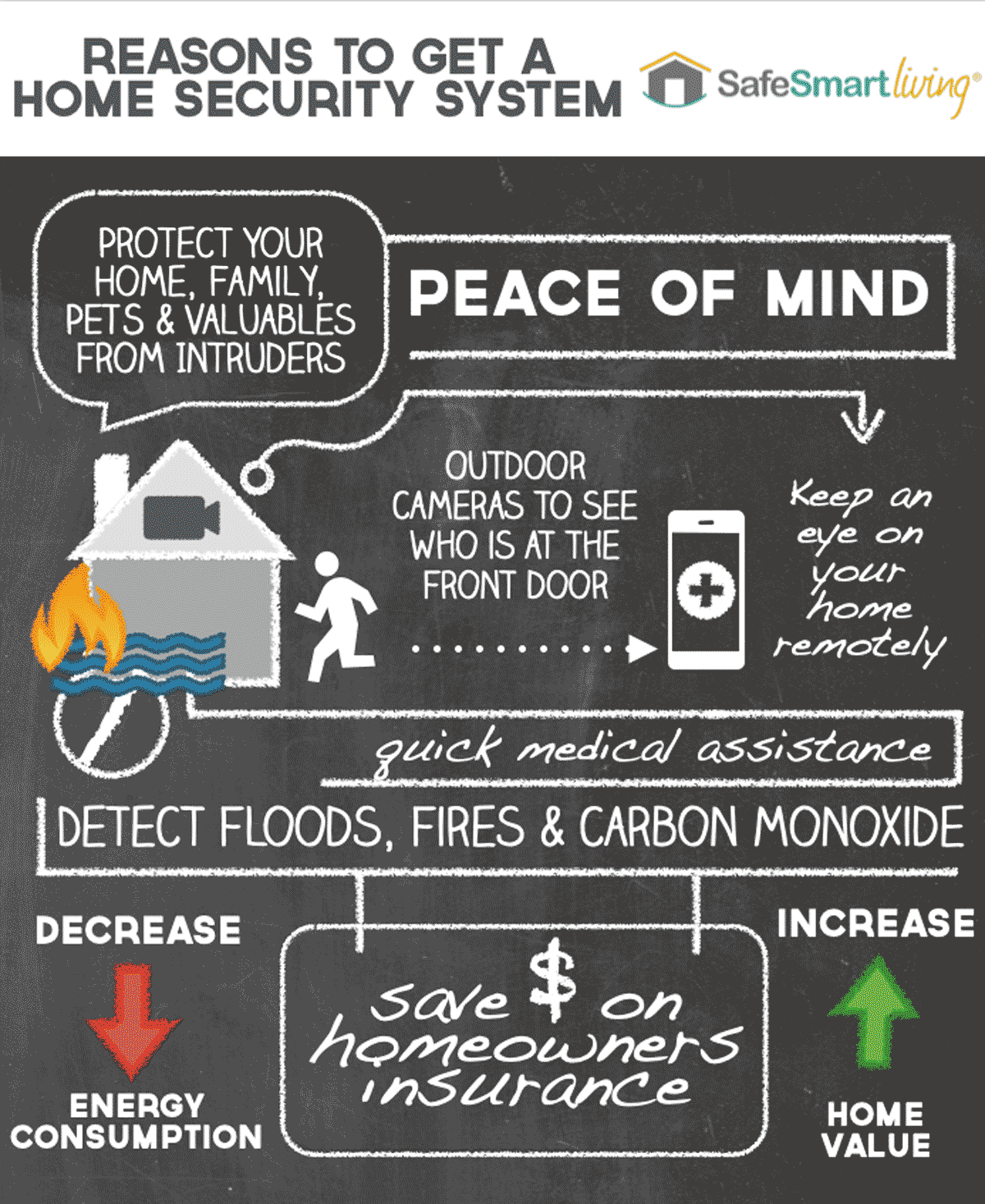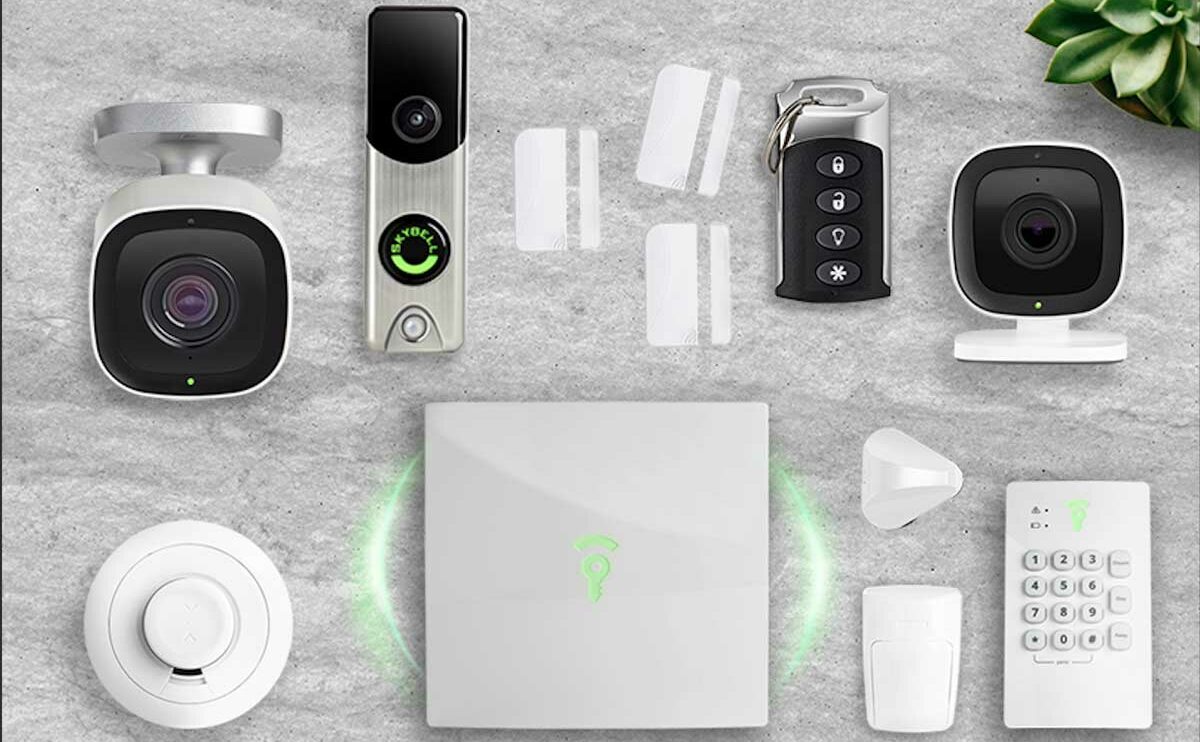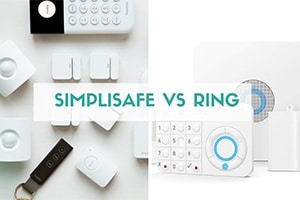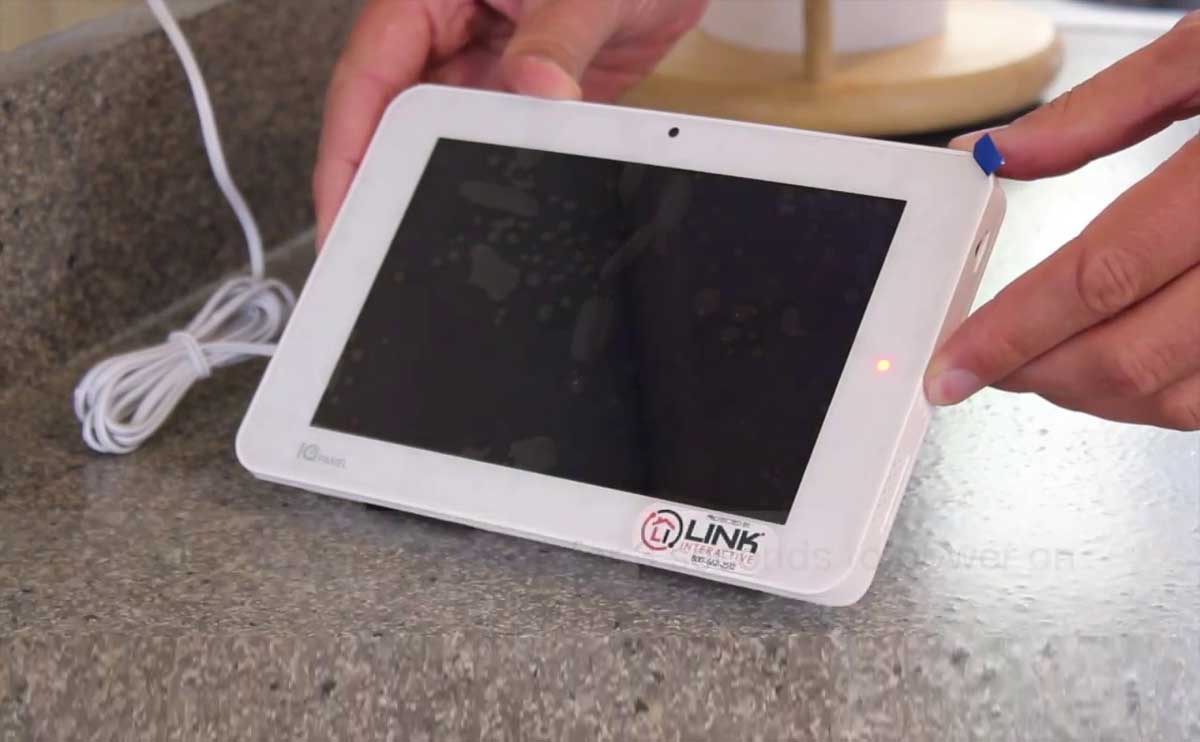How To Choose The Right Home Security System For Your Home
When you purchase through links on our site, we may earn a commission. Here’s how it works.

Home security has changed quite a bit since the old days of landline systems where burglars could cut the wire to sever communications between your home and a monitoring station. We’ve entered the era of smart technology, and home security is catching up to the times.
Along with a plethora of DIY offerings (think easy self-install at your own convenience vs having a professional hardwire equipment on a scheduled installation day and time), home security has expanded from the typical motion and door/window sensors to smart home technology that integrates everything from your door locks and light switches to your thermostats. The technology and terminology can be overwhelming, so we put together a guide on home security systems to help.
What’s A Home Security System Made Of?
Home security systems have come a long way from the typical motion, window and door sensor days. They now comprise a suite of smart technology that is used to not only deter but record and catch thieves. We’ll break it down for you one component at a time.
The Brains: Base Station, Hub & Control Panel
These can be a bit confusing because companies use different names for them. Below are the main components you’ll hear and should know about.
Hubs/Base Stations

These are the brains of your home security system; they control all the devices and sensors you have connected, transmit events to a central monitoring station and alert you of activities and events as they occur. Older systems may come with just a control panel, while newer systems often use a hub and touchscreen interface.
Control Panels/Keypads
Control panels are used to control your security system via a keypad or touchscreen interface. They’re typically installed near the hub, in an accessible area like your garage or outside your master bedroom.
At a minimum, the keypad lets you arm and disarm your system. Some go as far as to let you control everything, including smart devices, light schedules and more.
Key Fobs/Keychain Remotes

Before the advent of home security apps, your system included a key fob or physical remote control that would let you control essential functions of your security system such as arm, disarm and a panic button. They typically work within a specific range of your control panel and aren’t meant to function outside your home, so you don’t have to worry about accidentally setting it off when you’re miles away.
Where Should I Keep My Key Fob? It may be a good idea to keep one in your nightstand for quick access at night. However, you may want to relocate it when you’re gone as the nightstand is a typical point of intrusion during burglaries.
Essential Sensors: Door/Window, Motion & Glass Break
Almost every security system comes with the sensors listed below. They detect various types of intrusions, from doors and windows opening to glass breaking, and send a signal back to your base station if they are tripped.
Your goal should be to cover major entry points to the home and areas commonly visited or that contain valuables.
Glass Break Sensors

These sensors detect the sound of breaking glass via an audio microphone tuned to the frequency of glass breaking. They are commonly placed near glass windows and doors that could be used as entry points to your home.
The reach of a glass break sensor can vary, but you’re typically able to cover a couple of windows or a door and window along the same wall.
Door & Window Sensors

Also known as contact sensors, they attach to window sills or doorframes and activate when the door or window is opened. They can be used to monitor pretty much anything that opens or closes, like medicine or liquor cabinets, for example.
Motion Sensors
Motion sensors are among the most useful security sensors, as they cover a large area and catch many intrusion events. You’ll typically want to place these in the corner of a room, hallway or high traffic area of your home.
They activate when they sense motion within a certain range. A single motion sensor can cover several windows and eliminate the need for multiple window sensors, but since door/window sensors are typically used in stay/home mode, and motion sensors in away mode, it’s not a bad idea to have both.

Foolproof Your System By Combining Contact, Motion & Glass Break Sensors – As you may have imagined reading the descriptions above, if an intruder breaks the glass without opening the window, the window sensor will not activate. However, if you also have a motion and/or glass break sensor in the area, they will most likely trip one or the other upon entering.
Garage Door (Tilt) Sensors
Garage door sensors attach directly to your garage door. Since your garage door tilts as it opens, the sensor is designed to recognize and register this “tilting action.”
These sensors could technically be used on anything that tilts to register the tilting action. Still, we can’t think of much in a typical household aside from your garage door. Driveway Alarms
Driveway alarms notify you when people and/or vehicles enter your property via the driveway. We’ve written a dedicated article on driveway alarms where you can learn all about them.
Each Home Is Unique In Its Needs
Keep in mind, every home is unique, so not all homes need the same security setup. For instance, a 4th story condo might not need window sensors since that would require quite the ladder. But they could benefit from a motion sensor. Meanwhile, a stand-alone, ranch-style home could benefit from door and window sensors as well as a driveway alarm.
Questions To Ask Before You Buy
You’ll want to have these questions in-hand to make the most informed buying decision for your home. For example, what security system components do you really need? How much should you expect to pay and will you be tied to a contract? What does installation involve and how complicated is it (i.e. can you do it yourself)? I’m sure these are some of the questions running through your head – they were for me.
Here’s a run down of the questions you should ask any company before you buy. I have also put together the answers to help you choose the best home alarm system for you.
1. What Are My Options?
There are many (in my opinion, just enough to make it super confusing!) home security options, and lingo, out there. One thing you might be wondering is what’s the difference between home alarm and home security? As far as the industry’s concerned, not much. Technically speaking, a burglar alarm consists of just the skeleton sensors necessary to detect an intrusion (door, window, and motion) and notify the home owner with an audible noise. An alarm system extends this to also include fire and smoke detectors. Taking it a bit further, a home security system also can include monitoring by a central station, home security cameras, remote control via your smartphone, and home automation options such as automated lighting and door locks. Put all this together and you have what we call a smart home.
2. How Much Does Home Security Cost?
A simple burglar alarm can be purchased on Amazon for as little as $20. A self-monitored alarm system includes an extensive set of sensors including carbon monoxide, freeze and water sensors. A popular version is offered by SimpliSafe and it can be purchased for around $150 and up (when on sale). A full-fledged home security system is monitored by a central station and can be upgraded with all the bells and whistles, including home security cameras. Because this increases the upfront cost, the home security provider may lock you into a contract and spread out the cost of the equipment for a number of years. Prices typically start at $20 per month (although these days $50/month is more common) plus installation fees of $100 and up.
3. How Difficult Is Installation And Can I Do It Myself?
The top selling smart home security systems are marketed as DIY, with the option of professional assistance if you need it. Companies like ADT and some of the older companies in our reviews still require professional installation, which also comes at a cost. The burglar alarms you can buy on Amazon are self-install or DIY for the most part.
The good news is that the installation is relatively straightforward, and most providers include phone support should you need it. Essentially a DIY installation involves attaching sensors to your doors and windows using sticky peel-and-stick adhesive tape (which is also provided) such as these command strips by 3M (if applied correctly, they are easy to remove in the event that you need to relocate your system).
For most of the national security system companies there are professional install options available if you prefer. But they are typically an added cost and could involve drilling holes in your walls. So with wireless and cellular technologies dominating the industry, more companies, including our top pick Frontpoint, adhere primarily to a DIY (Do It Yourself) model. DIY allows customers like you to save on installation today and moving costs down the road. This also means you can do it when it’s convenient for you, and you won’t have to take time off work to meet the installer.
4. Are There Contracts?
There are only contracts with the home security providers that offer a financing option to help you subsidize the cost of equipment. Those contracts vary based on your needs but the longer the contract, the less you’ll have to pay upfront but the larger your bill will be in total (and the higher your cancellation fee will be (read: the balance on your contract) should you decide to leave early). Reading your contract carefully is key, as many home security providers have hidden or unexpected fees built in. Fortunately, we have created a series of how to cancel articles that dive deep into popular home security contracts and do the math on what you might owe should you find yourself locked into one.
5. Do I Need A Phone Line?
Not anymore. Older alarm systems relied on phone lines, but these are also prone to cutting by thieves, especially on older homes where the phone lines are exposed. The more cutting edge systems, including those you can buy and install yourself, offer a broadband (via your home Internet connection) or cellular (via cell towers) signal option. We strongly recommend the latter (cellular), as a broadband connection, if it’s cable internet, will also be subject to severing by burglars.
We still can’t believe that one of the most technologically progressive providers out there (ahem cough, Ring security) does not offer a cellular option. All a thief has to do is cut your internet line and your whole system goes offline. Not so with providers that offer cellular monitoring, like Frontpoint.
6. I’ve Heard A Lot About ADT. What’s All The Hype?
ADT is huge, and they are old. They’ve been around for years, and they use an authorized dealer program to sell their product in local markets. The upside of this is that they’re available nearly everywhere in the United States. The downside is that their customer service record varies greatly depending on location. This makes it difficult for us to review them as a national provider so be sure to check with your neighbors and also your reviews on your local Better Business Bureau, Yelp! Angie’s List, and social media (if you trust what you find there that is).
7. What Happens If I’m Broken Into?
The answer to this depends on the type of alarm system you have installed. With a self-monitored security system, if someone breaks into your house, you and/or contacts you have designated are notified. With a system that’s professionally monitored by a central station, you are notified first but if the alarm company can’t reach you, they will automatically dispatch authorities (read: law enforcement in the event of a break-in, or the fire department if one of your smoke or carbon monoxide sensors goes off). We highly recommend a professionally monitored system given the likelihood of something going wrong when either you’re a) asleep, or b) on vacation. Basically anytime your phone is off, on silent, or not around you, you would miss the alarm signal.
8. So Which Is The Best Home Alarm System?
We’ve done extensive research on this subject for more than a decade. If you can afford it, we recommend Frontpoint Security as the best home alarm option. They offer a 100% dedicated cellular connection (nearly impervious to tampering), the best customer service record from the companies we review, and patented crash and smash protection (when a break-in is detected, a signal is sent to the monitoring station; if a burglar smashes your alarm system control panel before a “disarm” command is received by the station, they will still deploy law enforcement).
But Frontpoint isn’t for everyone. We’ve reviewed over 17 companies and counting. Below our top picks for this year and category winners.
Top 3 Home Security Systems & Category Winners
| Frontpoint | Link Interactive | SimpliSafe | Ring | ADT | Vivint | |
|---|---|---|---|---|---|---|
| Ranking | 1st | 2nd | 3rd | Low Cost, No Contract | Professional Install | Smart Home |
| Total Score | 4.70 | 4.18 | 4.15 | 4.00 | 3.30 | 2.75 |
| Customer Service & Reputation | 4.8 | 4.3 | 4.5 | 4.0 | 2.0 | 1.0 |
| Equipment | 4.8 | 3.8 | 3.8 | 3.3 | 4.3 | 4.0 |
| Technology | 4.8 | 4.0 | 3.5 | 4.3 | 3.5 | 3.0 |
| Value | 4.5 | 4.5 | 4.5 | 4.0 | 3.0 | 2.0 |
| Ease Of Use | 4.8 | 4.3 | 4.5 | 4.5 | 3.8 | 3.8 |
| Read Review | Read Review | Read Review | Read Review | Read Review | Read Review |
17 Home Security Systems Reviewed
In addition to our top 3 and category winners, we cover more than a handful of additional home security companies, including some new entrants to the space touting fancy smart technologies, as well as providers readers have requested we review, in our comprehensive home security systems reviews.
INFOGRAPHIC: Reasons To Get A Home Security System (Printable PDF)
There’s many reasons to get a home security system. Here’s our top ones presented in a colorful infographic. And we made a printable PDF version you can print and post on your refrigerator.

What Does Smash Proof Mean And Why Is It Important?
Smash Proof (or Crash & Smash Protection, Smash Protected, etc.) are terms used to indicate that a hub/panel/base station is not vulnerable to a criminal disabling your alarm capabilities by destroying the brains of your home security system. Look for this type of protection before purchasing your security system.
What Is Crash & Smash?
Crash & Smash is a term used when a burglar gets to the brains of an alarm system and disables it before it can send a signal to your monitoring station, alerting them of the break-in. Many newer panels have built-in protection mechanisms to prevent this vulnerability.
How Does Crash & Smash Protection Work?
In general (check with your security company for specifics), the protection works like this – if a sensor is tripped while your system is armed, a signal is sent to your central monitoring station, and your system is put into a special status. This status only clears if a disarm signal is received. If your panel or hub is smashed, there won’t be a disarm signal sent, and the incident will be treated as an alarm event.
Do I Really Need A Home Security System?
According to the FBI’s crime report for 2019 (newer years haven’t been released yet) there were 6,925,677 (2 out of 100 homes on average) property crimes in the U.S. (that’s just one of the many home break-in statistics we’ve gathered). While rates vary by geographic area, home intrusions, property damage and burglaries can happen to anyone. In addition to general security purposes, there are many other benefits to having a home security system, such as these four:
4 Benefits Of A Home Security System
- Find out if there are unwanted animals or intruders in areas you choose to monitor (garage, crawl space, driveway, yard, porch, mailbox, etc.).
- Know when people are entering and leaving your home and manage their access. For example, you can use guest access codes to let the cleaning person or babysitter in, or unlock the door for them via your smartphone.
- Receive alerts when smoke or carbon monoxide is present in your home (a good way to keep pets safe when you’re not there).
- Integrate your security system with smart home devices, including thermostats, speakers, lighting and more.
Having a home security system can also help decrease the time it takes for police to arrive at your door. Instead of missing a break-in because you’re sleeping or hiding in a closet without your phone while a stranger ransacks your home, you could have someone else contact the police for you. You’d be surprised to learn what happens when you dial 911 and the average police response time.
If, for whatever reason, after reading this article, you choose not to get a security system, that’s totally fine, we’re only here to inform. We do recommend that, at a minimum, you follow these six precautions to secure your home:
Frequently Asked Questions
Here are our responses to questions we get asked frequently from our readers.
Who Has The Best Security Cameras?
Which home alarm system provider has the best security cameras? Some providers bundle them with their systems, some offer them as add-ons, and others allow you to purchase cameras separately (in case you aren’t in the market for an entire system, or you prefer one provider’s camera over another).
We’ve created an entire section of our website dedicated to security cameras.
Do I Need A Home Security System If I’m Home All The Time?
Even if you work from home, are retired or spend the majority of your time at your home, we still recommend having a security system. Being home doesn’t make you immune from a home break-in, a kitchen fire or carbon monoxide poisoning. A security system can help you monitor all of these potential hazards and more.
Did you know that, according to the U.S. Dept. of Justice, household burglaries that occurred when no one was home were more likely to occur between the daytime hours of 6am to 6pm (43%) than between the hours of 6pm to 6am (26%)?
It’s important to note that an intruder can break into your home at any time day or night. Having a home security system in place can help get authorities to your home sooner to keep you safer and your home protected.
Can Purchasing A Home Security System Give Me A Discount On My Homeowners Insurance?
In many cases, yes. It depends on the security company you choose, whether you opt for professional or self-monitoring and what insurance provider you use. We encourage you to contact your homeowners insurance carrier and ask about potential discounts you could take advantage of with your home security system.
What Can A Home Security System Do Besides Monitor My Home’s Activity?
A home security system can also help you save money on your energy bill. And some home automation equipment can cut costs on your energy consumption. Smart lights, smart thermostats, smart plugs and more can be controlled via an app, so not only can you control lights and appliances (such as your HVAC system) while you’re away, you can put them on schedules to save energy.
Will My Pets Set Off My Alarm?
If you have pets and you’re worried either that they’ll create false alarms or you want to make sure they’re protected from fire, flood and carbon monoxide dangers, read our article on the best pet-friendly home security systems for the scoop on companies that have equipment and sensors geared to support our four-pawed friends.
What Does A Home Security System Do Besides Monitor My Home’s Activity?
A home security system can also help you save money on your energy bill. And some home automation equipment can cut costs on your energy consumption. Smart lights, smart thermostats, smart plugs and more can be controlled via an app, so not only can you control lights and appliances (such as your HVAC system) while you’re away, you can put them on schedules to save energy.
Who Regulates Home Security Companies?
On the national level, the FTC (Federal Trade Commission) provides consumer protection by monitoring companies and looking for misleading advertising, aggressive sales tactics, and deceptions and scams. They have a published a guide on avoiding security system scams specifically.
Regulation on the state level depends on where you live. In California, for instance, The Bureau of Security and Investigative Services (part of the CA Department of Consumer Affairs) licenses and regulates businesses and professionals in security, including alarm companies. In Florida, meanwhile, the FDACS (Florida Department of Agriculture and Consumer Services) licenses and regulates the private security industry.
What’s Most Important?
When shopping for a home security system, there are several factors to consider. It’s important to find a company that fits your lifestyle and home layout. It’s easier than ever to install your own system, but that doesn’t mean picking a provider is as simple.
If smart home features or customization is a priority, you may want to select a company that excels in those areas. If you prefer reliability, you’ll need a monitoring plan you can trust.
Our best home security systems article covers companies that have an established reputation and meet our high standards and rigorous review process.



